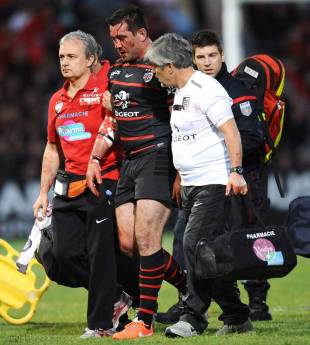|
Concussion debate
RFU gets tough on concussion
ESPN Staff
October 16, 2014

The Florian Fritz incident in the Top 14 last season hammered home the need for a no-nonsense approach to concussion and the need at times protecting players from themselves and others close to the game
© Getty Images
Enlarge
English rugby has unveiled major changes to the way concussion is handled in the professional game. The whole subject is one which has become a major concern, fuelled by legal cases in the NFL in the USA which many fear could spill over into legal action by current and former players in the UK. Research has also shown evidence of progressive degenerative diseases in the brains of several dead American football players. In what is a joint venture between the RFU, Premiership Rugby and the Rugby Players' Association (RPA), all players, coaches and officials will now need to pass an online module, or risk a fine or even a suspension. The main areas which are under the spotlight are concussion awareness, management in games and 'return to play' protocol. In 2012-13, concussions were the most common injury in the Premiership with 54 occurring in matches, and five in training. "The science of brain injury and how you manage it is also developing very quickly and the changes in landscape has really focused the minds of sporting organisations," the RFU's chief medical officer Dr Simon Kemp told the BBC. All players, coaches and officials in the professional game will have to participate in an online module is designed to improve the awareness and understanding of concussion. Harlequins' Mark Lambert, an RPA representative, said: "Some players probably still take concussion lightly, but hopefully this is a big step in the right direction." The deadline for completion of the module is 11 December with fines for anyone failing to meet that cut-off. Quins director of rugby Conor O'Shea told the BBC coaches will continue to adopt a strict no-nonsense approach when it comes to head injuries. "Anytime you talk about the head, it is a brain injury and has to be taken seriously," he said. "From a coaching point of view, head injury means off the pitch. It is no longer a badge of honour to get up and play on, or play two or three days after you have had a head knock. You cannot." Bath University will monitor and report on the Graduated Return to Play pathways for Premiership Rugby and England players. © ESPN Sports Media Ltd
|
Live Sports
Communication error please reload the page.
-
Football
-
Cricket
-
Rugby
-
- Days
- Hrs
- Mins
- Secs
F1 - Abu Dhabi GP
Abu Dhabi Grand Prix December 11-131. Max Verstappen ()
2. Valtteri Bottas (Mercedes)
3. Lewis Hamilton (Mercedes)
4. Alexander Albon ()
5. Lando Norris ()
6. Carlos Sainz Jr ()
-
ESPNOtherLive >>
Snooker - China Open
Tennis - Miami Open

